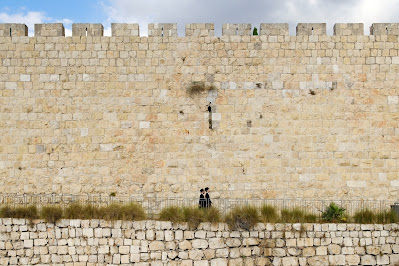- Get link
- X
- Other Apps
Nehemiah 3
The free podcast has expired but can be purchased at:
https://payhip.com/b/h8k1T
https://payhip.com/b/h8k1T
- Summary
This chapter records in detail the individuals, groups, and families involved in rebuilding different sections of Jerusalem's city wall.
- Thoughts
I noticed 3 things as I read through this chapter:
1. The rebuilding of the wall sounds very orderly. Each group of people or families appeared to be rebuilding a particular section, from one landmark to another.
2. There appears to have been a variation in the way which some people worked.
3. That quite a few of the families/groups rebuilt the wall in front of their houses.
These observations speak to me firstly of the order with which God will have things to be done. He is not a God of confusion or muddle. We see this in the Creation. God created something specific and purposefully each day. The Apostle Paul on instructing the Corinth church on how to conduct worship in an orderly way said, 'For God is not the author of confusion, but of peace' 1 Corinthians 14:33.
We can apply this practically in our own lives, to be encouraged to be methodical and orderly as we face each day and the tasks in it. When I first started running my own home although naturally a fairly tidy person I felt overwhelmed wondering when I should clean certain things and how often, and how to keep on top of the constant re-dirtying of everything we touch and use - and we only live in a small bungalow! After a bit of research I adopted and adapted a system, which brought order and routine.
Secondly, this chapter spoke to me of the manner in which we face our God given tasks . Nehemiah was inspired by God to note that in the section repaired by the Tekoites, 'their nobles put not their necks to the work of their LORD' (verse 5); the section repaired by Shallum was done by him, 'and his daughters' (verse 12); and that the section rebuilt by Baruch was done 'earnestly' (verse 20).
What a contrast between the Tekoites and Baruch. My study Bible states that the phrase 'put not their necks to the work' indicates petty pride rather than halfheartedness. Either way, there seems to be something amiss with their attitude for 'the work of their LORD', whereas Baruch worked with zeal and warmth (Strong's concordance interpretation of working earnestly). And then Shallum perhaps did not have sons, so he rallied his daughters to help, which I imagine was not their normal role, but such was their desire to contribute to the rebuilding. This reminds me that whatever work the Lord has put before us to 'do it heartily, as to the Lord, and not unto men' (Colossians 3:23).
Thirdly, noticing that the families seemed to rebuild the wall in front of their own house seems to speak to me of focusing on the job at hand, that which has been given us to do, and not being busybodies or comparing ourselves to others. It reminds me of the time when Peter, after having been given instructions by the Lord to 'Feed his sheep', asked what John would have to do. But instead of telling him or discussing John with Peter, Jesus answered, '...what is that to thee? follow thou me' (John 21:22).
Photo by Scott Umstattd on Unsplash
In a similar way Paul encourages the believers at Thessalonica to study (or aspire) to be quiet, to do (mind) their own business, and work with their own hands that they might walk uprightly and lack nothing (1 Thessalonians 4: 11).
Let us be encouraged that when we are overwhelmed, feel inadequate and don't know what to do first, to start with the job/task/item nearest to us. Do it with all our hearts, looking to the Lord for help, and aim to develop a way of working, methodically and consistently, that will bring order and peace out of the confusion and give glory to the Lord as a witness of how a Christian lives.
Enjoyed this post?
Subscribe for weekly content



Comments
Post a Comment